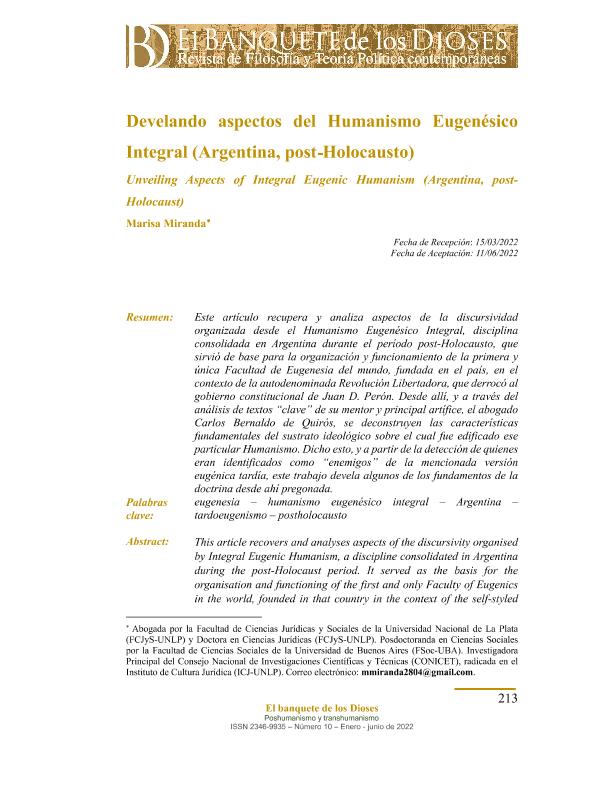Mostrar el registro sencillo del ítem
dc.contributor.author
Miranda, Marisa Adriana

dc.date.available
2023-10-11T17:19:07Z
dc.date.issued
2022-07
dc.identifier.citation
Miranda, Marisa Adriana; Develando aspectos del Humanismo Eugenésico Integral (Argentina, post-Holocausto); Universidad de Buenos Aires. Facultad de Ciencias Sociales. Instituto de Investigaciones Gino Germani; El Banquete de los Dioses; 10; 7-2022; 213-237
dc.identifier.issn
2346-9935
dc.identifier.uri
http://hdl.handle.net/11336/214887
dc.description.abstract
Este artículo recupera y analiza aspectos de la discursividad organizada desde el Humanismo Eugenésico Integral, disciplina consolidada en Argentina durante el período post-Holocausto, que sirvió de base para la organización y funcionamiento de la primera y única Facultad de Eugenesia del mundo, fundada en el país, en el contexto de la autodenominada Revolución Libertadora, que derrocó al gobierno constitucional de Juan D. Perón. Desde allí, y a través del análisis de textos “clave” de su mentor y principal artífice, el abogado Carlos Bernaldo de Quirós, se deconstruyen las características fundamentales del sustrato ideológico sobre el cual fue edificado ese particular Humanismo. Dicho esto, y a partir de la detección de quienes eran identificados como “enemigos” de la mencionada versión eugénica tardía, este trabajo devela algunos de los fundamentos de la doctrina desde ahí pregonada.
dc.description.abstract
This article recovers and analyses aspects of the discursivity organised by Integral Eugenic Humanism, a discipline consolidated in Argentina during the post-Holocaust period. It served as the basis for the organisation and functioning of the first and only Faculty of Eugenics in the world, founded in that country in the context of the self-styled Revolución Libertadora, which dismissed the constitutional government of Juan D. Perón. From there, and through the analysis of "key" texts by its mentor and principal agent, the lawyer Carlos Bernaldo de Quirós, the fundamental characteristics of the ideological substratum on which this Humanism was built are deconstructed here. That said and based on the detection of those who were identified as "enemies" of the aforementioned late eugenic version, this work unveils some of the foundations of the doctrine proclaimed therein.
dc.format
application/pdf
dc.language.iso
spa
dc.publisher
Universidad de Buenos Aires. Facultad de Ciencias Sociales. Instituto de Investigaciones Gino Germani

dc.rights
info:eu-repo/semantics/openAccess
dc.rights.uri
https://creativecommons.org/licenses/by-nc/2.5/ar/
dc.subject
EUGENESIA
dc.subject
HUMANISMO EUGENÉSICO INTEGRAL
dc.subject
ARGENTINA
dc.subject
TARDOEUGENISMO
dc.subject.classification
Ciencias Sociales Interdisciplinarias

dc.subject.classification
Otras Ciencias Sociales

dc.subject.classification
CIENCIAS SOCIALES

dc.title
Develando aspectos del Humanismo Eugenésico Integral (Argentina, post-Holocausto)
dc.title
Unveiling Aspects of Integral Eugenic Humanism (Argentina, postHolocaust)
dc.type
info:eu-repo/semantics/article
dc.type
info:ar-repo/semantics/artículo
dc.type
info:eu-repo/semantics/publishedVersion
dc.date.updated
2023-10-03T10:23:12Z
dc.journal.number
10
dc.journal.pagination
213-237
dc.journal.pais
Argentina

dc.journal.ciudad
Ciudad Autónoma de Buenos Aires
dc.description.fil
Fil: Miranda, Marisa Adriana. Universidad Nacional de La Plata. Facultad de Ciencias Jurídicas y Sociales. Instituto de Cultura Jurídica; Argentina. Consejo Nacional de Investigaciones Científicas y Técnicas. Centro Científico Tecnológico Conicet - La Plata; Argentina
dc.journal.title
El Banquete de los Dioses
dc.relation.alternativeid
info:eu-repo/semantics/altIdentifier/url/https://publicaciones.sociales.uba.ar/index.php/ebdld/article/view/7334
Archivos asociados
